Social networks in Russia, winter 2014-2015. Numbers, trends, forecasts
We present new data from the research cycle “ Social networks in Russia today: numbers, trends, forecasts ”, for the second half of 2014. This is the fifth regular publication of current data on the penetration of social media in the regions of Russia, the demographic analysis of the authors of the messages and the degree of their activity, as well as on the levels of positive in various social media. For the first time, the study presents data on the social network Instagram.

It should be noted that for the first time in the course of research according to TNS data, there has been a slight decrease in the monthly audience of social networks Odnoklassniki, Moi Mir and LiveJournal.
')
The first place in popularity among social networks, as before, is taken by VKontakte, whose attendance in November 2014 increased to 54.6 million people, Odnoklassniki occupy the second place with a monthly audience of 40.1 million people.
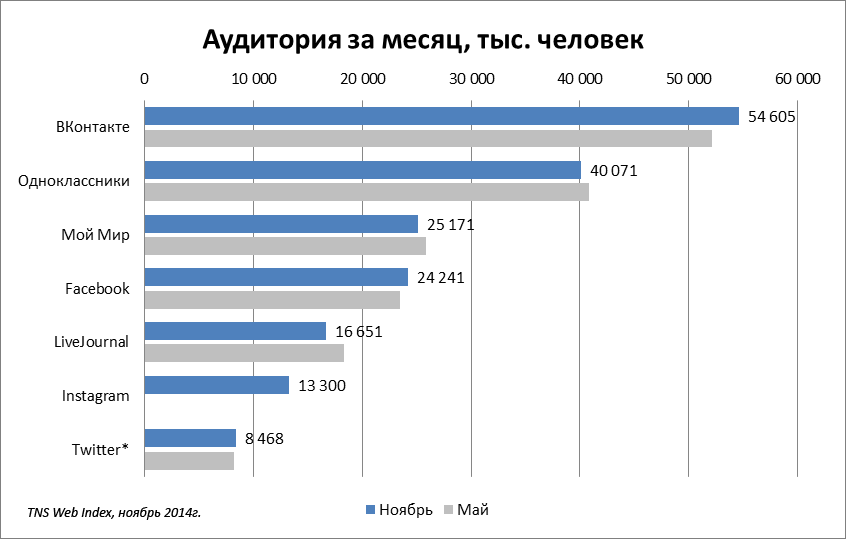
* Twitter data are extrapolated based on daily and weekly audience.
The study further provides data on “talking” users who openly express their position with public messages in social media. There were more than 35 million such active authors in December 2014 in Russia, which generate more than 40 million messages per day. Active authors, creating public content, make social networks a relevant indicator of public sentiment, allowing you to catch the "live" social problems at the very beginning of the formation of significant trends.
As for the volume of content posted daily on social networks, Twitter and VKontakte share first and second places.
It is worth noting that six months ago, the first place in the number of published content was VKontakte, which in Russia traditionally takes over some of the functions that Twitter performs in the world - the exchange of short status messages. However, by the end of the year, leadership in terms of content with a small margin was left for Twitter.
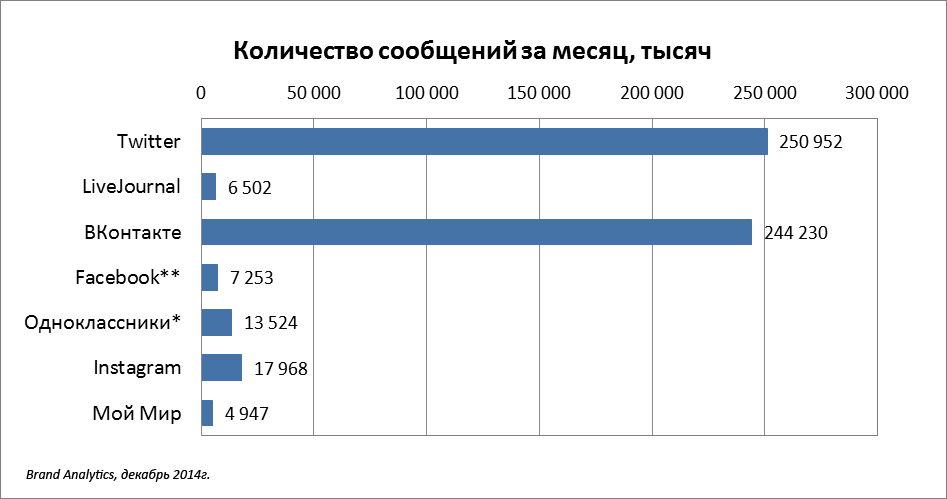
* Classmates - data for the Top 100,000 groups
** Facebook - lower score
In terms of the number of “writing” Russian authors, VKontakte leads, with an order of magnitude ahead of competitors - 23.8 million unique authors. The next on the second place Instagram - only 2.7 million authors.
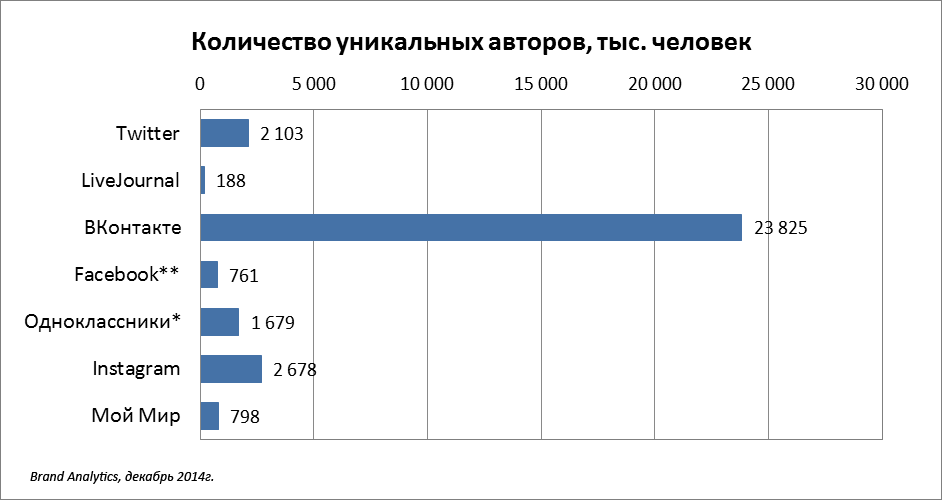
* Classmates - data for the Top 100,000 groups
** Facebook - lower score
Twitter is the leader in terms of engagement - 119.3 posts per month account for one active author on this network. In second place on this indicator - LiveJournal - 34.6 posts. The rest of the social networks show very close results: 10.3 on VKontakte, and 6.2 on the My World network.

* Classmates - data for the Top 100,000 groups
** Facebook - lower score
The monthly audience * - 54.6 million people , half of which - 23.8 million - showed public activity.
Gender of authors **
 41.3%
41.3%  58.7%
58.7%
The gender structure of VKontakte authors has not changed much as compared with May data and is within the margin of error (0.1%).
Age of authors

Compared to the May data, the active authors of VKontakte matured - the number of authors younger than 18 years old decreased by 4%, from 18 to 24 years old - by 1%, while the number of authors aged 25 to 34 years and from 35 to 44 increased by 6 % and 1% respectively.
Geography of authors **
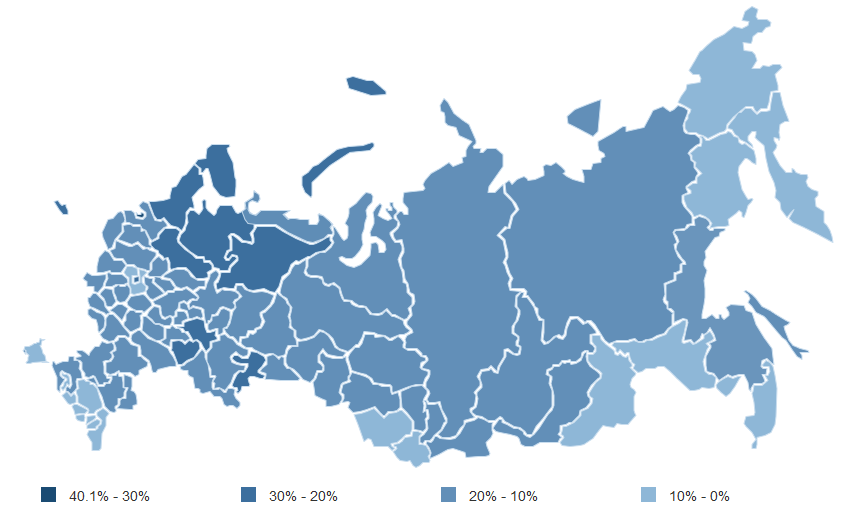
The penetration of VKontakte in the regions of Russia increased among the leading regions - on average by 5%. As before, the greatest penetration of VKontakte in St. Petersburg is 40% of the population of the region, second place is Moscow - 29%.
Classmates, as before, remain primarily a platform for interpersonal communication. The monthly audience * of the network is 40 million people , while only 1.7 million authors demonstrate public activity in groups.
Gender of authors **
 29.8%
29.8%  70.2%
70.2%
In Odnoklassniki the share of female audience increased even more - by 7%.
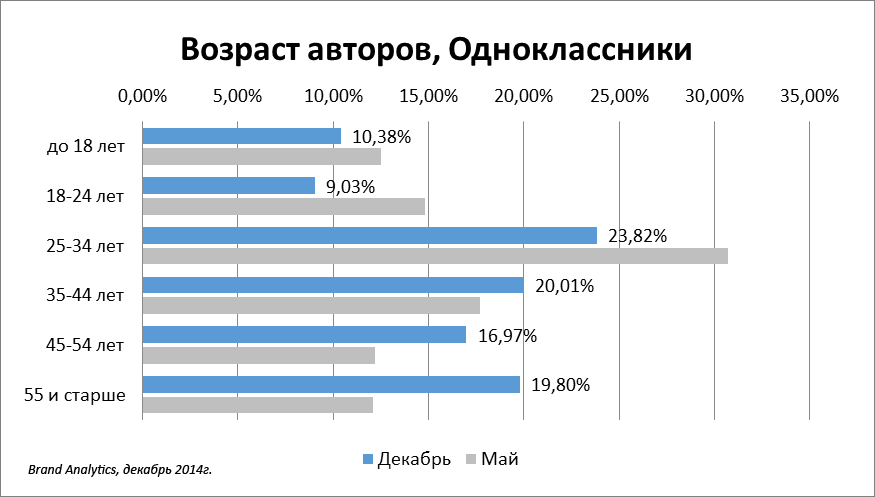
Classmates, as well as VKontakte, demonstrate a trend for growing up audience. With the reduction of authors under 24 years old by 6%, the number of authors aged 35–44 years increases by 2%, 45–54 years old by 5%, and over 55 years old by 8%.
Geography of authors **

Classmates are traditionally more popular in the regions of Russia, in the first place in terms of penetration, as before the Sakhalin Oblast, Khabarovsk and Zabaykalsky Krai.
The December study showed a serious drop in the activity of users on the My World network compared to summer data. Thus, according to November data, the monthly audience of the network * was 25.1 million people , and the number of active authors in December was only 0.8 million people .
Gender of authors **
 42.7%
42.7%  57.3%
57.3%
The gender structure of My World practically did not change, the proportion of men increased by 1.3% compared with May data.
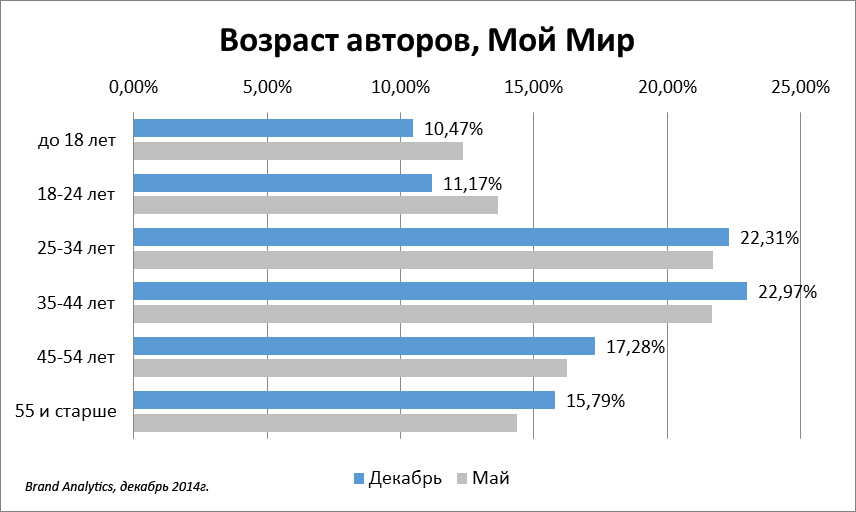
The age structure of the authors in My World is almost unchanged. The number of authors under the age of 18 and from 18 to 24 years decreased by 2% and 3% respectively. In all groups older than 25 years, the number increased by 1-2%.
Geography of authors **

The top 5 regions in terms of penetration remained virtually unchanged, but the proportion of My World authors among the population has decreased significantly. The Chelyabinsk region is in the lead in the ranking, and if in May 4.22% of its inhabitants showed public activity in My World, in December their share was only 1.39%.
Facebook
On Facebook, the activity of the authors is consistently low. According to the results of the November measurements, the monthly audience * of the network was 24.2 million people , the number of active authors in December was 0.8 million people .
Gender of authors **
 46.2%
46.2%  53.8%
53.8%
The gender distribution of authors on Facebook has not changed since May.
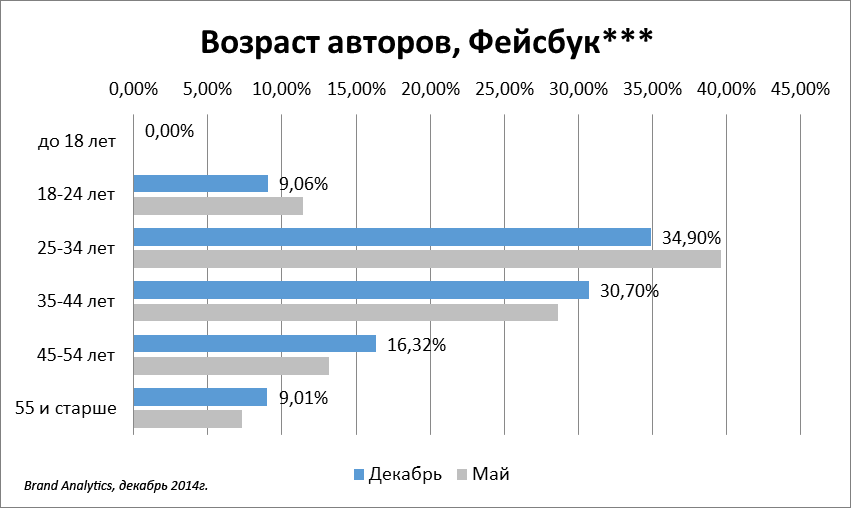
*** according to Facebook rules a person can be at least 18 years old.
On Facebook, the most noticeable changes occurred in the group of authors of the range of 34 - 44 years old - their number decreased by 10%. At the same time, the share of authors aged from 25 to 34 years and from 45 to 54 years increased significantly - by 6% and 3%, respectively. The number of authors older than 55 years has increased by 2%.
Geography of authors **
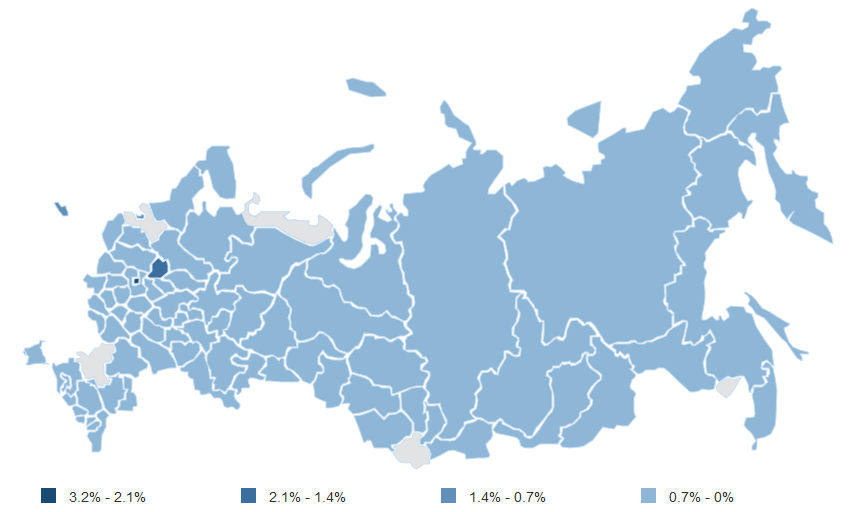
Moscow is leading in terms of Facebook penetration, followed by Yaroslavl Oblast and St. Petersburg. In May, data on Facebook penetration were not published, but in general, the level of penetration of this network turned out to be quite expected.
LiveJournal remains a place for “to read, not to talk” lovers: out of 16.7 million people of a monthly audience *, only 188 thousand authors are active.
Gender of authors **
 55.8%
55.8%  44.2%
44.2%
The number of active male LJ authors increased by 2.5%. It is worth noting that LiveJournal is still the only popular social network with a predominantly male audience.

LiveJournal is the only social network that has become younger over the past 6 months: almost 3% of authors under 18, authors aged from 18 to 24 years old increased by 2.5%, authors from 35 to 44 years old decreased by 4%, and in the remaining age groups, the number of authors decreased on average by 2%.
Instagram
Instagram is gaining popularity in Russia and bypasses Twitter in both the number of active authors and the size of the audience. The monthly audience of the network * was 13.3 million people , and the number of active authors was 2.7 million .
Gender of authors **
 29.4%
29.4%  70.6%
70.6%
Among the active authors of Instagram, the vast majority - 70.6% are female audience. Despite the predominance of the fair sex in all social networks, Instagram is the undisputed leader on this indicator.
Data on the age of active authors in Instagram is missing.
Geography of authors **

In terms of penetration, Instagram leads the Leningrad Region, Moscow, Sakhalin and Moscow Regions. Instagram is participating in the research for the first time, so it’s impossible to talk about dynamics for now, the dynamics will be revealed in our next regular research.
Twitter
Twitter has significantly reduced the pace, but nonetheless continues to grow. In November, the resource audience * amounted to 8.5 million people , and the number of active authors - 2.1 million people .
Gender of authors **
 45.6%
45.6%  54.4%
54.4%
Data on the age of active authors on Twitter is missing.
Geography of authors **

In terms of Twitter penetration into the regions of Russia, the previous leaders of the rating - St. Petersburg and Moscow practically did not change their shares, but lost places in the rating due to the growth in the number of residents of the Sakhalin Region and the Chukotka Autonomous Region who became the leaders of the rating.
Age of authors
The youngest social network - Vkontakte. Here, the minimum number of active authors is over 44 years old, authors over 35 is only 6%. The core of the active audience falls on authors aged 18 to 34 years.
The most adult network is Odnoklassniki: authors under 25 years old are only 19%, the core of the active audience is 24-44 years old and almost 20% are users over 54 years old.
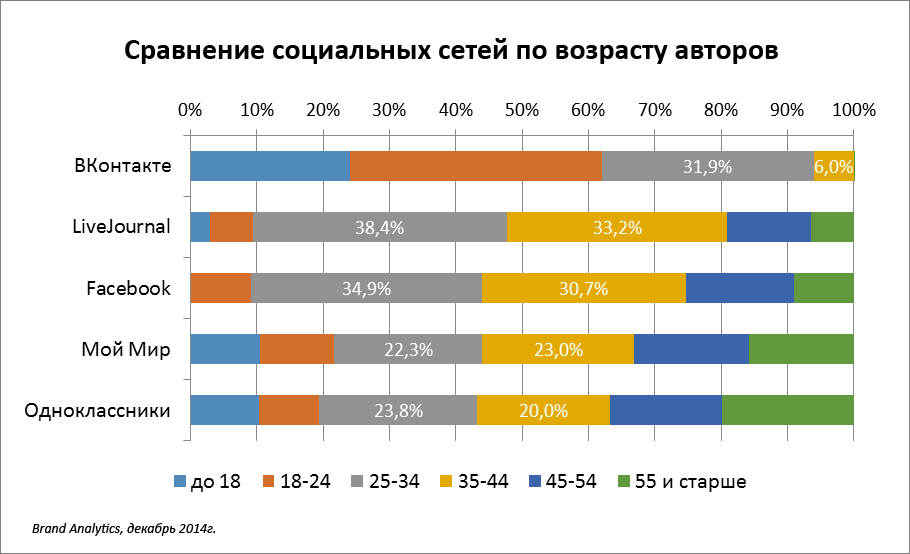
For Twitter and Instagram data on the age of active authors are missing.
Gender of the authors
With regard to the gender distribution of active authors, women dominate in almost all social networks. Instagram and Odnoklassniki are in the lead - 50.6% and 50.2% respectively. The only exception is LiveJournal, in which there are only a few men, but still more than women - 55.8%.
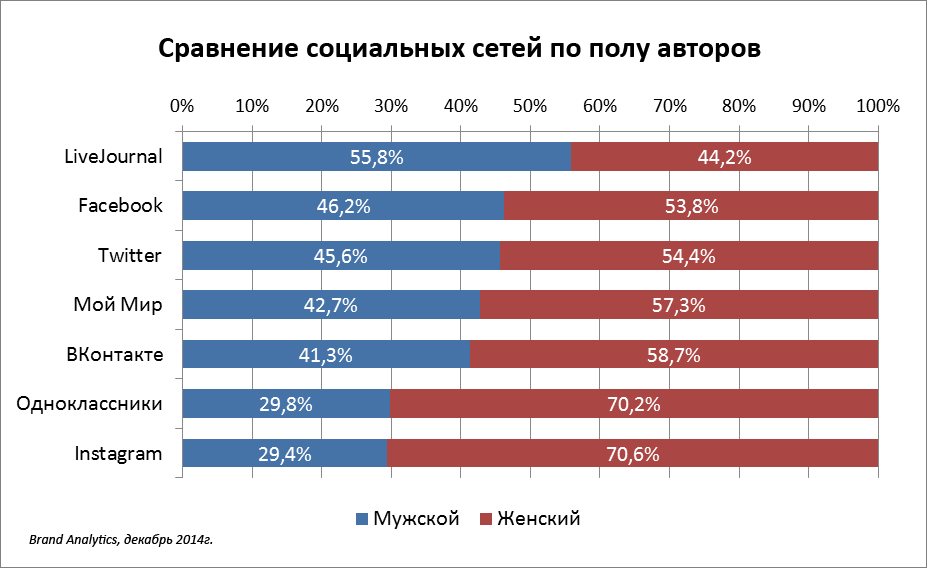
The number of positive messages in social networks prevails over the negative, compared with the summer data, the number of positives has increased. Positive leader is Instagram, the number of positive messages is 91%. In second place - My World: 88% positive messages. VKontakte and Facebook show similar results - 83% and 82% positive, respectively. A bit worse with the positive in Odnoklassniki and Twitter - here there are slightly less positive messages: 77% and 76%. And the maximum negative is almost 30% for LiveJournal.
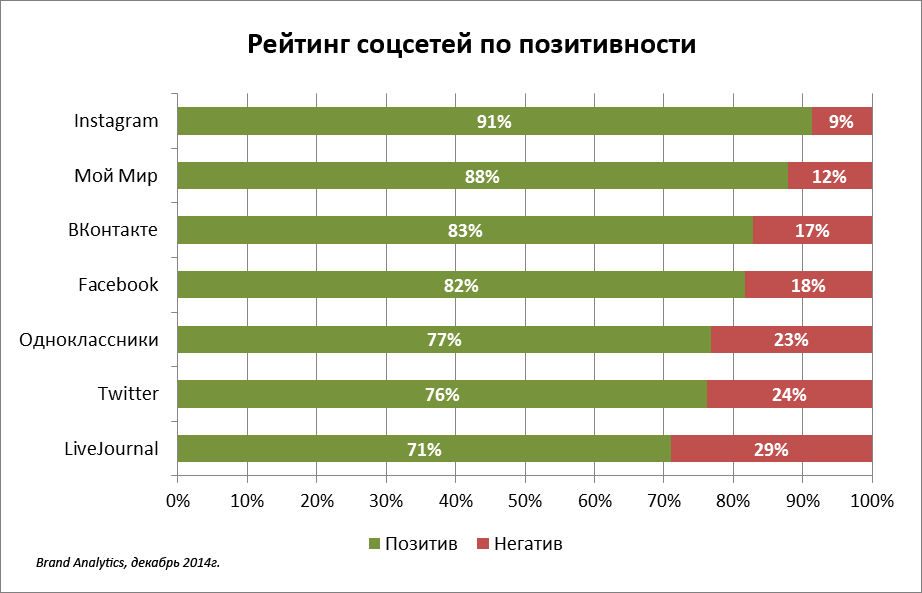
* TNS Web Index, November 2014
** Brand Analytics, December 2014
The study “Social Networks in Russia, Winter 2014-2015” in the presentation format can be downloaded at SlideShare here .

It should be noted that for the first time in the course of research according to TNS data, there has been a slight decrease in the monthly audience of social networks Odnoklassniki, Moi Mir and LiveJournal.
')
The first place in popularity among social networks, as before, is taken by VKontakte, whose attendance in November 2014 increased to 54.6 million people, Odnoklassniki occupy the second place with a monthly audience of 40.1 million people.

* Twitter data are extrapolated based on daily and weekly audience.
The study further provides data on “talking” users who openly express their position with public messages in social media. There were more than 35 million such active authors in December 2014 in Russia, which generate more than 40 million messages per day. Active authors, creating public content, make social networks a relevant indicator of public sentiment, allowing you to catch the "live" social problems at the very beginning of the formation of significant trends.
Number of public messages and authors
As for the volume of content posted daily on social networks, Twitter and VKontakte share first and second places.
It is worth noting that six months ago, the first place in the number of published content was VKontakte, which in Russia traditionally takes over some of the functions that Twitter performs in the world - the exchange of short status messages. However, by the end of the year, leadership in terms of content with a small margin was left for Twitter.

* Classmates - data for the Top 100,000 groups
** Facebook - lower score
In terms of the number of “writing” Russian authors, VKontakte leads, with an order of magnitude ahead of competitors - 23.8 million unique authors. The next on the second place Instagram - only 2.7 million authors.

* Classmates - data for the Top 100,000 groups
** Facebook - lower score
Twitter is the leader in terms of engagement - 119.3 posts per month account for one active author on this network. In second place on this indicator - LiveJournal - 34.6 posts. The rest of the social networks show very close results: 10.3 on VKontakte, and 6.2 on the My World network.

* Classmates - data for the Top 100,000 groups
** Facebook - lower score
Portrait of a user of social networks
In contact with
The monthly audience * - 54.6 million people , half of which - 23.8 million - showed public activity.
Gender of authors **
 41.3%
41.3%  58.7%
58.7%The gender structure of VKontakte authors has not changed much as compared with May data and is within the margin of error (0.1%).
Age of authors

Compared to the May data, the active authors of VKontakte matured - the number of authors younger than 18 years old decreased by 4%, from 18 to 24 years old - by 1%, while the number of authors aged 25 to 34 years and from 35 to 44 increased by 6 % and 1% respectively.
Geography of authors **

| No | Region | Authors | % of population |
| Total in Russia | 23,825,463 | 16.35% | |
| one | St. Petersburg | 2 017 450 | 40.12% |
| 2 | Moscow | 3,478,374 | 29.04% |
| 3 | Murmansk region | 204 516 | 26.21% |
| four | Republic of Karelia | 160,620 | 25.22% |
| five | Kaliningrad region | 240,027 | 25.14% |
| ... | |||
| 81 | Jewish Autonomous Region | 9,283 | 5.38% |
| 82 | Karachay-Cherkess Republic | 19 348 | 4.10% |
| 83 | The Republic of Dagestan | 93,715 | 3.18% |
| 84 | Chechen Republic | 33,045 | 2.49% |
| 85 | The Republic of Ingushetia | 8,644 | 1.95% |
The penetration of VKontakte in the regions of Russia increased among the leading regions - on average by 5%. As before, the greatest penetration of VKontakte in St. Petersburg is 40% of the population of the region, second place is Moscow - 29%.
Classmates
Classmates, as before, remain primarily a platform for interpersonal communication. The monthly audience * of the network is 40 million people , while only 1.7 million authors demonstrate public activity in groups.
Gender of authors **
 29.8%
29.8%  70.2%
70.2%In Odnoklassniki the share of female audience increased even more - by 7%.

Classmates, as well as VKontakte, demonstrate a trend for growing up audience. With the reduction of authors under 24 years old by 6%, the number of authors aged 35–44 years increases by 2%, 45–54 years old by 5%, and over 55 years old by 8%.
Geography of authors **

| No | Region | Authors | % of population |
| Total in Russia | 1,679,088 | 1.15% | |
| one | Sakhalin region | 11 347 | 2.30% |
| 2 | Khabarovsk region | 26,566 | 1.98% |
| 3 | Transbaikal region | 20 394 | 1.86% |
| four | Sevastopol | 6,950 | 1.81% |
| five | Tomsk region | 19,128 | 1.80% |
| ... | |||
| 81 | Leningrad region | 6,327 | 0.36% |
| 82 | Republic of Tatarstan (Tatarstan) | 12,965 | 0.34% |
| 83 | Vologodskaya Oblast | 3,557 | 0.30% |
| 84 | Tyva Republic | 861 | 0.28% |
| 85 | Republic of Karelia | 1,738 | 0.27% |
Classmates are traditionally more popular in the regions of Russia, in the first place in terms of penetration, as before the Sakhalin Oblast, Khabarovsk and Zabaykalsky Krai.
My world
The December study showed a serious drop in the activity of users on the My World network compared to summer data. Thus, according to November data, the monthly audience of the network * was 25.1 million people , and the number of active authors in December was only 0.8 million people .
Gender of authors **
 42.7%
42.7%  57.3%
57.3%The gender structure of My World practically did not change, the proportion of men increased by 1.3% compared with May data.

The age structure of the authors in My World is almost unchanged. The number of authors under the age of 18 and from 18 to 24 years decreased by 2% and 3% respectively. In all groups older than 25 years, the number increased by 1-2%.
Geography of authors **

| No | Region | Authors | % of population |
| Total in Russia | 798,295 | 0.55% | |
| one | Chelyabinsk region | 48 530 | 1.39% |
| 2 | Moscow | 139 600 | 1.17% |
| 3 | St. Petersburg | 48,950 | 0.97% |
| four | Khabarovsk region | 12,247 | 0.91% |
| five | Primorsky Krai | 16,893 | 0.87% |
| ... | |||
| 81 | Republic of Kalmykia | 422 | 0.15% |
| 82 | Tyva Republic | 478 | 0.15% |
| 83 | Chechen Republic | 1,702 | 0.13% |
| 84 | The Republic of Dagestan | 3,137 | 0.11% |
| 85 | The Republic of Ingushetia | 228 | 0.05% |
The top 5 regions in terms of penetration remained virtually unchanged, but the proportion of My World authors among the population has decreased significantly. The Chelyabinsk region is in the lead in the ranking, and if in May 4.22% of its inhabitants showed public activity in My World, in December their share was only 1.39%.
On Facebook, the activity of the authors is consistently low. According to the results of the November measurements, the monthly audience * of the network was 24.2 million people , the number of active authors in December was 0.8 million people .
Gender of authors **
 46.2%
46.2%  53.8%
53.8%The gender distribution of authors on Facebook has not changed since May.

*** according to Facebook rules a person can be at least 18 years old.
On Facebook, the most noticeable changes occurred in the group of authors of the range of 34 - 44 years old - their number decreased by 10%. At the same time, the share of authors aged from 25 to 34 years and from 45 to 54 years increased significantly - by 6% and 3%, respectively. The number of authors older than 55 years has increased by 2%.
Geography of authors **

| No | Region | Authors | % of population |
| Total in Russia | 761 115 | 0.52% | |
| one | Moscow | 379,610 | 3.17% |
| 2 | Yaroslavskaya oblast | 21 120 | 1.66% |
| 3 | St. Petersburg | 61 175 | 1.22% |
| four | Kaliningrad region | 7,574 | 0.79% |
| five | Tomsk region | 5,236 | 0.49% |
| ... | |||
| 81 | Rostov region | 169 | 0.00% |
| 82 | Leningrad region | 63 | 0.00% |
| 83 | Altai Republic | 6 | 0.00% |
| 84 | Nenets Autonomous Okrug | 0 | 0.00% |
| 85 | Jewish Autonomous Region | 0 | 0.00% |
Moscow is leading in terms of Facebook penetration, followed by Yaroslavl Oblast and St. Petersburg. In May, data on Facebook penetration were not published, but in general, the level of penetration of this network turned out to be quite expected.
Livejournal
LiveJournal remains a place for “to read, not to talk” lovers: out of 16.7 million people of a monthly audience *, only 188 thousand authors are active.
Gender of authors **
 55.8%
55.8%  44.2%
44.2%The number of active male LJ authors increased by 2.5%. It is worth noting that LiveJournal is still the only popular social network with a predominantly male audience.

LiveJournal is the only social network that has become younger over the past 6 months: almost 3% of authors under 18, authors aged from 18 to 24 years old increased by 2.5%, authors from 35 to 44 years old decreased by 4%, and in the remaining age groups, the number of authors decreased on average by 2%.
Instagram is gaining popularity in Russia and bypasses Twitter in both the number of active authors and the size of the audience. The monthly audience of the network * was 13.3 million people , and the number of active authors was 2.7 million .
Gender of authors **
 29.4%
29.4%  70.6%
70.6%Among the active authors of Instagram, the vast majority - 70.6% are female audience. Despite the predominance of the fair sex in all social networks, Instagram is the undisputed leader on this indicator.
Data on the age of active authors in Instagram is missing.
Geography of authors **

| No | Region | Authors | % of population |
| Total in Russia | 2 677 872 | 1.84% | |
| one | Leningrad region | 164,137 | 9.37% |
| 2 | Moscow | 680 461 | 5.68% |
| 3 | Sakhalin region | 25 577 | 5.18% |
| four | Moscow region | 259 539 | 3.68% |
| five | Kaliningrad region | 156 527 | 3.11% |
| ... | |||
| 81 | The Republic of Dagestan | 6,913 | 0.23% |
| 82 | Chukotka Autonomous District | 115 | 0.23% |
| 83 | Chechen Republic | 2,226 | 0.17% |
| 84 | Tyva Republic | 487 | 0.16% |
| 85 | The Republic of Ingushetia | 169 | 4.00% |
In terms of penetration, Instagram leads the Leningrad Region, Moscow, Sakhalin and Moscow Regions. Instagram is participating in the research for the first time, so it’s impossible to talk about dynamics for now, the dynamics will be revealed in our next regular research.
Twitter has significantly reduced the pace, but nonetheless continues to grow. In November, the resource audience * amounted to 8.5 million people , and the number of active authors - 2.1 million people .
Gender of authors **
 45.6%
45.6%  54.4%
54.4%Data on the age of active authors on Twitter is missing.
Geography of authors **

| No | Region | Authors | % of population |
| Total in Russia | 2,103,253 | 1.44% | |
| one | Sakhalin region | 21 676 | 4.39% |
| 2 | Chukotka Autonomous District | 1,726 | 3.40% |
| 3 | Moscow | 387 197 | 3.23% |
| four | St. Petersburg | 153,428 | 3.05% |
| five | Kaliningrad region | 22,279 | 2.33% |
| ... | |||
| 81 | The Republic of Ingushetia | 2,247 | 0.51% |
| 82 | Karachay-Cherkess Republic | 2,290 | 0.49% |
| 83 | Republic of Adygea | 1,828 | 0.41% |
| 84 | The Republic of Dagestan | 7,877 | 0.27% |
| 85 | Chechen Republic | 3 332 | 0.25% |
In terms of Twitter penetration into the regions of Russia, the previous leaders of the rating - St. Petersburg and Moscow practically did not change their shares, but lost places in the rating due to the growth in the number of residents of the Sakhalin Region and the Chukotka Autonomous Region who became the leaders of the rating.
Comparison of socio-demographic characteristics of the authors
Age of authors
The youngest social network - Vkontakte. Here, the minimum number of active authors is over 44 years old, authors over 35 is only 6%. The core of the active audience falls on authors aged 18 to 34 years.
The most adult network is Odnoklassniki: authors under 25 years old are only 19%, the core of the active audience is 24-44 years old and almost 20% are users over 54 years old.

For Twitter and Instagram data on the age of active authors are missing.
Gender of the authors
With regard to the gender distribution of active authors, women dominate in almost all social networks. Instagram and Odnoklassniki are in the lead - 50.6% and 50.2% respectively. The only exception is LiveJournal, in which there are only a few men, but still more than women - 55.8%.

Positive and negative in social networks
The number of positive messages in social networks prevails over the negative, compared with the summer data, the number of positives has increased. Positive leader is Instagram, the number of positive messages is 91%. In second place - My World: 88% positive messages. VKontakte and Facebook show similar results - 83% and 82% positive, respectively. A bit worse with the positive in Odnoklassniki and Twitter - here there are slightly less positive messages: 77% and 76%. And the maximum negative is almost 30% for LiveJournal.

Trends and forecasts
- The main trend of the second half of 2014 is the explosive growth of Instagram in Russia. This network for the first time got into TNS research by audience, and by the number of active authors came out on the second line, after VKontakte.
- Social networks that are traditionally popular in Russia are growing up - there is a simultaneous reduction in the share of users under 18 and an increase in the share of the older audience.
- The gender structure of social networks is stable and almost unchanged. In all networks, except for LJ women predominate. Interestingly, the most feminine social network - Instagram, is at the same time the most positive, while the “male” LiveJournal is the most negative social network.
- The trend for positive remains in all social networks, despite the difficult economic and political situation in the country. The share of positive on average increased by 10%.
- Summarizing, it can be noted that social networks in Russia continue to grow, although not as active as before. Instagram has the largest growth margin and, to a lesser extent, Twitter.
* TNS Web Index, November 2014
** Brand Analytics, December 2014
The study “Social Networks in Russia, Winter 2014-2015” in the presentation format can be downloaded at SlideShare here .
Source: https://habr.com/ru/post/248645/
All Articles